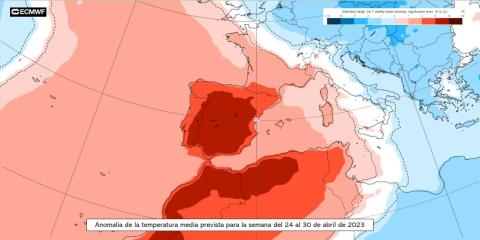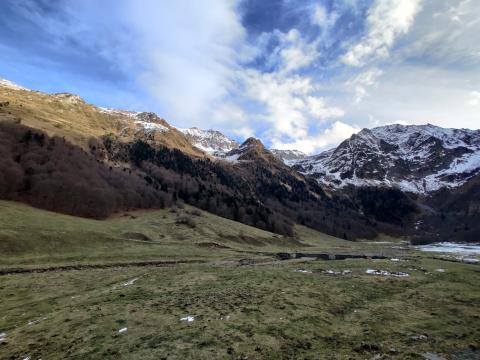Reactions: Study attributes April's unusually high temperatures on the Iberian Peninsula to climate change
Climate change made the late April episode of record temperatures in the Iberian Peninsula, Morocco and Algeria 100 times more likely to occur, with temperatures up to 3.5°C higher than they would have been without the climate crisis. This is one of the conclusions of an attribution study conducted by World Weather Attribution.
Dominic Royé - estudio de atribución EN
Dominic Royé
Researcher at the Galician Biological Mission – CSIC
The study is of the highest quality. The WWA (World Weather Attribution) initiative was initiated by Friederike Otto, one of the world's leading scientists in attribution studies. Attribution studies of extreme events around the world are carried out on an ongoing basis.
I would particularly highlight the fact that, even in a warmer climate, the event experienced was very exceptional, with a return period of 400 years. Even so, without global warming the event would have been about 2°C lower, which confirms what we expressed as scientists a few weeks ago: without global warming such an extreme event was impossible. It must be said that these are very conservative estimates and it is likely that the estimate is underestimated due to modelling issues. That is why the authors say that, in the future, with a global warming of 2ºC, it could be an event with even higher temperatures of at least 1ºC.
In terms of limitations, unfortunately, the study was limited to the southern half of the Iberian Peninsula, although impossible temperatures were reached even in the north.
Ernesto Rodríguez - estudio atribución EN
Ernesto Rodríguez Camino
Senior State Meteorologist and president of Spanish Meteorological Association
The rapid attribution study conducted by World Weather Attribution (WWA) of the extreme heat event of 26-28 April 2023 that affected the Iberian Peninsula concludes that anthropogenic climate change makes the probability of such an event at least 100 times higher in a context of climate change than in the absence of climate change, so that it would have been almost impossible to have taken place without climate change.
The rapid attribution methodology developed by WWA has passed all filters associated with peer review, has been applied on many other occasions, is well-tested and scientifically sound. The methodology is based on using pre-calculated simulations - in this case, from CMIP6 - to avoid performing slow and computationally expensive simulations, and thus to be able to conduct the study in near-real time.
In addition, to avoid the collection of observational data that may delay the study, use is made of the ERA5 reanalysis extended with the operational analysis of the European Centre for Medium-Range Forecasts between 1 and 27 April and, in turn, extended with the forecast for 28-30 April.
Regarding the denomination of heat wave or extreme high temperature event, this is merely a terminological difference as there is no standardised and internationally recognised definition of heat wave. AEMET, for example, for its definition refers daily maximum temperatures to the months of July and August, so that the AEMET definition of heat wave can hardly be applied to hot episodes in months other than those of the summer period.
José Miguel Viñas - estudio atribución EN
José Miguel Viñas
Meteorologist at Meteored at www.tiempo.com and consultant for the WMO (Spain)
We can rely on attribution studies such as this one. The computing power of supercomputers means they can be carried out in a short time (days), which is also desirable, since if their publication takes too long (weeks or months) they lose media interest, although not as a tool for characterising the greater or lesser exceptionality of a given meteorological episode in the current context of global warming.
The study certifies something that was already intuited on those hot days in April, given the exceptional nature of the heat episode. The study not only makes it possible to attribute this episode to climate change, but thanks to the statistical analysis carried out and the climate simulation, it is able to quantify the (very low) probability of having temperatures in the region of 40ºC in April if we were to eliminate the global warming signal and it were only a consequence of atmospheric variability itself.
The main limitations of these studies are the climatological databases with which they work, thinking especially of records prior to the 1960s, as there were not so many available. Despite this, the confidence level of these studies is high.
Francisco Doblas - estudio atribución EN
Francisco J. Doblas-Reyes
ICREA Professor, Director of the Earth Sciences Department at the Barcelona Supercomputing Center
It is a preliminary and faster analysis than usual. It uses data that are not exactly local observations but are still of high quality. The methodology follows the usual procedure that WWA uses, with a mixture of statistical methods using both observations and simulations, in this case only global ones.
The conclusions are consistent with existing knowledge of temperature behaviour in the area in a context of climate change.
I would highlight, on the one hand, their speed. The conclusions are clear and point to the responsibility of climate change due to human action to increase the intensity of an event of this type. The change in the frequency of these events that they deduce is less conclusive. The contextualisation of the study is excellent, clearly explaining the importance of the adaptation strategies that are being developed (and need to be further developed). It is an essential source of information for the public to better understand the specific risks we face with climate change.
It would be useful to explain that tools exist for predicting these events several days to several weeks in advance, with varying degrees of accuracy depending on the time horizon.
The authors acknowledge that the work is preliminary and needs to be refined using additional observations and simulations. It is also important to note that, as the authors mention several times, the models used have difficulties in reproducing observed temperature trends in the region.
Sjoukje Philip et al.
- Research article
- Non-peer-reviewed
- Modelling
- Observational study



